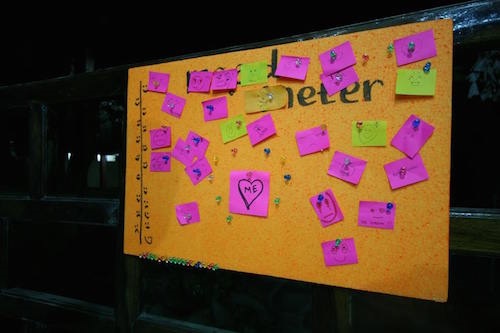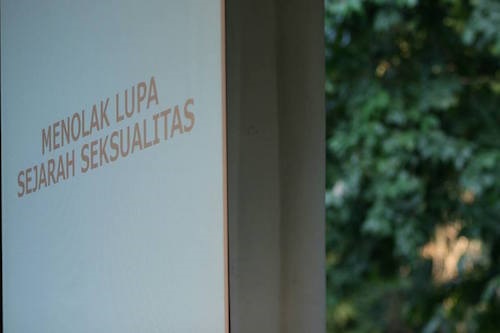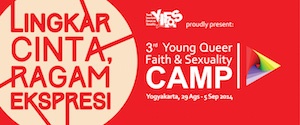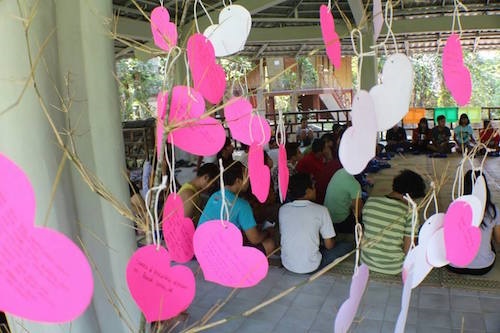The Youth Interfaith Forum on Sexuality links faith and sexuality to encourage participation in the fight against discrimination
In March 2010, the International Lesbian, Gay, Bisexual, Trans and Intersex Organisation Conference was set to go ahead in Surabaya, Java. A group of conservative Muslims, some of them members of the Front Pembela Islam (Islamic Defenders Front), occupied the hotel where Conference participants were staying. The police ordered that the conference be cancelled for reasons of public safety. Later that year the same group of conservative Muslims attacked an international gay film festival in Jakarta. In response to these events, a group of ten young people came together to create the Youth Interfaith Forum on Sexuality (YIFOS).
Four years later, during the summer of 2014, I meet Yulia and Vica, two of the organisation’s members, in a café in Malioboro Street, Yogyakarta. Both have come from Jakarta to discuss ideas with Yogyakarta-based activists working on lesbian, gay, bisexual and transgender (LGBT) rights in the city. Yulia and Vica seem excited to talk about their project. While having an ice cream, with some Arabic-style Indonesian songs playing in the background, we speak about sexuality and faith in Indonesia, and the work of YIFOS.
Creating safe spaces
YIFOS began as a community-based organisation bringing together members of Muslim, Catholic and Buddhist communities. The organisation’s goal was to foster exchange between members of different religions about faith and sexuality. ‘In Indonesia we never have the chance to discuss our own sexuality,’ Vica points out. The lack of safe spaces for young people to speak freely about sexuality and faith was what prompted YIFOS’s establishment.
From its conception, YIFOS has aimed to involve religious leaders in its efforts. ‘So we invited religious leaders to talk at local groups and discuss sexuality and faith.’ Yulia explains that people of all religions are welcome to join this discussion, providing they are willing to bring an open mind. The focus of YIFOS dialogues is always to put young people first, allowing them to search out grounds of commonality, negotiating religious values and issues of concern around sexuality and the LGBT community, without fear of judgement.
The inclusion of religious authorities in debates on sexuality is a new phenomenon in Indonesia. The country has seen the emergence of interfaith organisations such as Interfidei in Yogyakarta in 1991, or the Regional Interfaith Youth Network formed in Ambon in 2005. However, YIFOS is the first space in which simultaneous discussions on sexuality and faith are encouraged. Unlike other groups working in a single city or region, YIFOS has operated across the country since 2011. For Catholic communities, the organisation has visited centres where regular discussions among youth regarding sexuality were already in place. With participants already in place, all that YIFOS needs to provide are materials. YIFOS also works with Islamic youth organisations on university campuses.

Before the arrival of YIFOS, reflects Yulia, ‘it was quite difficult to talk about sexuality within faith groups; but also when we went to LGBT groups, they were quite reluctant to speak about God.’ By creating safe spaces where young people can feel comfortable speaking about their sexual and religious identities, the participants in YIFOS dialogues are able to realise what they have in common as young people, instead of focusing on their differences.
Fear and love
After two years of running dialogues, YIFOS decided that more in-depth programs were the way forward. The idea of an annual camp arose, and in 2012, for a period of five days, more than 40 participants came together in Yogyakarta for the inaugural Young Queer Faith and Sexuality Camp. The camp was deemed a success and the program was extended to eight days in 2013 and 2014, drawing participants from across the country. In 2013, the organisation decided that more fruitful discussion could be had in smaller groups, and reduced the number of participants to 30. In 2014, 29 attendants were selected from 104 applicants.
During the 2014 camp, which took place in a secret location – for the participants’ safety – from 29 August to 5 September, members from Buddhist, Christian, Hindu and Islamic faiths presented their perspectives on sexuality. Abdul Muiz, member of the Islamic organisation Fahmina, told participants to lose their fear of being bullied and harassed about their sexual orientation. He highlighted that Islam is about ‘giving love and caring for each other’. This was a welcome perspective for camp participants.
The camp’s lectures and debates are not the only way to develop tolerance towards sexual and religious minorities via dialogue. The participants also get the chance to join with communities that have experienced discrimination in order to understand their experiences. In previous years the camp participants visited an Islamic boarding school for transgender-identifying people in Yogyakarta. In 2014, the participants visited the Ahmadiyyah community in Yogyakarta, a minority subset that has been subject to attacks in Indonesia by mobs and branded as heretics by mainstream Muslims who consider this group a deviant sect of Islam. Dialogue participants also had the chance to observe the work being done at People Like Us – an organisation that fights for LGBT rights and raises awareness on the problems faced by sexual minorities.

Vica highlights the importance of these fieldtrips in the camp program, noting how participants can experience ‘difference between their ideas and these people’s ideas, their values and the relation between these communities and sexuality’. We should not forget Indonesia’s motto 'unity in diversity' to understand this process. Personal understanding comes not only from camp discussions and from the interaction between participants, but also from communication with groups who face difficult situations in their everyday life. These real, lived experiences of others also show how difficult it still is to talk about these topics outside the safe space of the YIFOS-hosted dialogues.
The power of young people
YIFOS also aims to equip young people to engage their wider communities and spread ideas and information on sexual education once the camp is over.
Researcher Kristina Schneider, who visited the camp in 2014, indicates that the initial sessions focus on the participants themselves through 'getting to know you' games: for example, shaking hands and introducing themselves. As she explains, one of the activities asked the participants to write down the first thing they thought of when hearing the word ‘body’. With this, she notes, ‘the aim is to discover the body as a medium for transformation’.
Throughout the camp participants are emboldened to share their knowledge on matters of sexuality and faith and reach out to the wider community. While older generations may find it difficult to discuss and engage in debates on sexuality, young people are increasingly willing to raise these questions. YIFOS recognises that youth can be influential amongst the broader public too, and serve an educational role. According to Vica, ‘We want to endorse youth participation at the level of decision-making. We know that they have the potential to do things.’
YIFOS works with the assumption that across Indonesia, those under thirty years of age are not given the attention they deserve as a generation of newly graduated individuals that will build the future of the country. Vica believes this is changing though, and particularly so with the work of YIFOS. ‘At some point the participants in the discussions will hold positions in which they can influence other people through the experiences they have today.’ Their activities are seen as an investment for the future.

Looking to the future
As a small youth-led organisation, funding is a significant challenge. Currently YIFOS relies on donations and participant fees, but is seeking to grow a stable funding base. The organisation also plans to start a program to train participants as actors and educators in their own community. ‘This year we have started to think about advocacy programs,’ says Yulia, ‘which means that we are not focusing only on raising awareness and building alternative education, but we want to speak up at the governmental level.’ Participants in the annual event consider ‘the camp not to be the end of their journey. Many feel that they have to get involved in broader activism’, comments Yulia. ‘Although not an easy task, same-sex attracted participants have started to mobilise their faith group peers’. Now more than ever young people in Indonesia are able to speak on sexuality and faith, and participate in decision-making at the state and community level.
In the midst of this, the organisation continues organising dialogues for a growing number of participants every year. It seems that ideas on faith and sexuality are slowly changing Indonesian youth. But, as the two activists conclude, this is a long-term project and much is to be done before open views on sexuality and faith are fully spread throughout society.
In response to the question of why discrimination against sexual minorities still exists in Indonesia, Vica remains deep in thought for several seconds before replying. She suggests, ‘religious leaders are often considered to be faultless, like they’ve never done anything wrong’, adding ‘but we forget sometimes that religious leaders are also humans’. Through creating a safe space for dialogue and introducing new interpretations and interactions between people with different sexual orientations and religious identities, YIFOS aims to influence these religious leaders’ responses in future.
Diego García Rodríguez (diegogarcia1989@gmail.com) completed a Master’s degree in the Asian Studies program at Lund University, Sweden. His work focuses on Indonesian gender and religion. Diego is a former intern at GAYa Nusantara.












